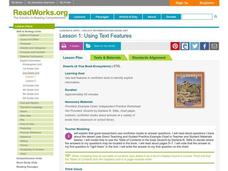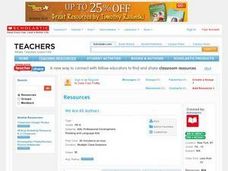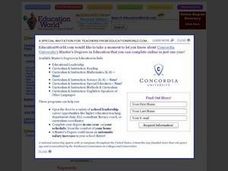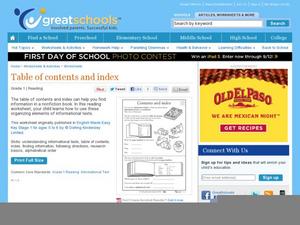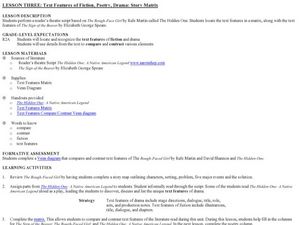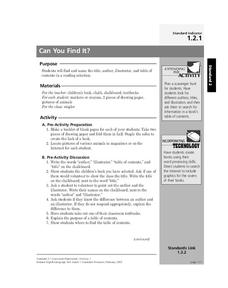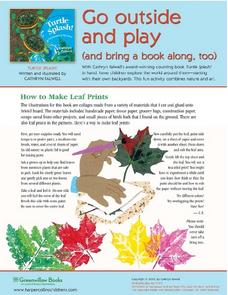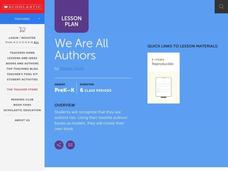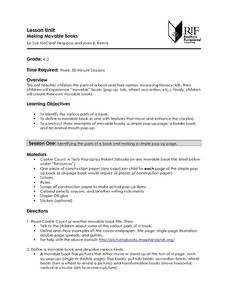Curated OER
Introduce: Comprehension Monitoring using About Trees
As scholars begin reading more difficult text, they need to acquire an arsenal of comprehension strategies. Here are few helpful ones to guide new readers through the informational text About Trees, which is linked here for printing....
Curated OER
Using Text Features
Investigate a "table of contents" with your students! They read the table of contents in Deserts by Darlene R. Stille and predict where the answers to specific questions might be found. Learners complete a worksheet in which they find...
Teacherfiles
Portfolio Contents
Learners can create a portfolio in any class and use this handy table of contents to organize their work effectively. Individuals are asked to include their best work alongside work that demonstrates areas for progress. The table of...
Curated OER
We Are All Authors: Create a Book
Every child is an author with this engaging reading activity. First the class reviews the various parts of a book such as the title, author, dedication, and author-biography. Then each individual will choose a story of their own to...
Curated OER
My Community Book
Young learners examine different places in their neighborhood using informational texts. First they identify a place that they like to play and predict if it will be in the nonfiction book Community at Play.They will share their favorite...
Curated OER
Introduce: Cause and Effect
Introduce beginning readers to cause and effect in a story by exploring it together. Learners make predictions about a book based on its cover, title, and a brief flip through the pages. They listen to an explanation of cause and effect...
Curated OER
"Me" Resource
Learners elucidate themselves by writing up to six entries in different formats. Some formatting choices include a dictionary, encyclopedia, or atlas entry, a magazine article, a newspaper article, and a table of contents. Some...
Curated OER
Nonfiction Books: Table of Contents and Index
How do you find what you're looking for when reading a nonfiction book? Even first graders can learn how to use a table of contents and an index. They use the provided images of each to locate information and answer nine questions.
Curated OER
Contents and Index
It's important for your readers to understand features of informational text such as index and table of contents, so give them this visual activity to get started. They read a brief explanation of informational text, then look at an...
Curated OER
Text Features of Fiction, Poetry, Drama: Story Matrix
How do novels differ from plays? Explore with your class the text features of fiction and drama by reading The Hidden One: Native American Legend and then performing a reader’s theater script based on the story. Class members create a...
Curated OER
Can You Find It?
Plan a Parts of a Book scavenger hunt. Begin by giving your young adventurers a book, and asking them to find the title, author, illustrator, and table of contents. After a discussion of the purpose of each of these items, class members...
Curated OER
Non-Fiction Text Features
Distinguish between textual features of non-fiction in the book The Lewis and Clark Expedition and in the non-fiction story "Ta-Na-e-Ka." Third graders create posters and participate in group discussions to show their understanding of...
Curated OER
Identifying Text Features of a Self-Written Fable
Make learning the parts of a book fun by having pupils construct their own glossary entries, table of contents, and title page. Beginning with a review of text features and a hunt for examples, kids use previously written fables to...
Curated OER
My First Book
Introduce young writers to the process of writing a book. Start by reading a book of your choice and discussing the essential elements of any book such as the cover, story, and illustrations as well as who is responsible for each...
Curated OER
Cathryn Falwell Books
Learn more about making texture prints with a variety of objects. Young illustrators are introduced to Turtle Splash! and Scoot! in order to examine the collage illustrations. They create their own illustrations by making paint prints of...
Curated OER
We Are All Authors
Read and discuss a variety of books by different authors and have your class create their own book. They will identify the different parts of a book, then using a story they have already written, they enter their story and information...
Curated OER
Making Movable Books
Investigate the parts of a book and in particular, the pop-up, tab, wheel, and or accordion features that can be added to a book to move and enhance the storyline. This is a three lesson unit.
Curated OER
Responding to Literature
Your class will create a four section flip book and write titles for characters, setting, problem, and solution. They will also draw a picture to show what they wrote about.
Curated OER
Review Parts of a Book
Begin the year with a review of the parts of a book. Exercises in the unit plan ask emergent readers to identify the information on the cover of a book and on the title page, to explain the purpose of a table of contents, and to describe...
Curated OER
Contents Page 1 (Table of Contents)
After inspecting the illustrated sample of a Table of Contents provided on a one-page worksheet, primary readers write their responses to five questions based on the model.
Curated OER
Parts of a Book Crossword Puzzle
A Parts of a Book worksheet asks emergent readers to complete an eight-question crossword puzzle using the words provided in a word bank. The definitions of the key terms are the vertical and horizontal clues. An answer key is provided.
Curated OER
School - Home Links: Parts of a Book
Parents or learning partners assist emergent readers with a School-Home Links worksheet. The children complete a matching activity about the parts of a book which include a table of contents, title page, and glossary. They match the word...
Curated OER
School-Home Links
Engage parents in their child’s learning process with a School-Home Links worksheet. The one-page resource offers a definition and an example of a book with chapters. With the guidance of their parent or learning partner, the child...
Curated OER
Identifying Features of Nonfiction Text
Learners explore nonfiction text. They identify the cover, title page, and table of contents of a nonfiction book. Pupils work in groups to create a chapter for a nonfiction class book about heroes.



